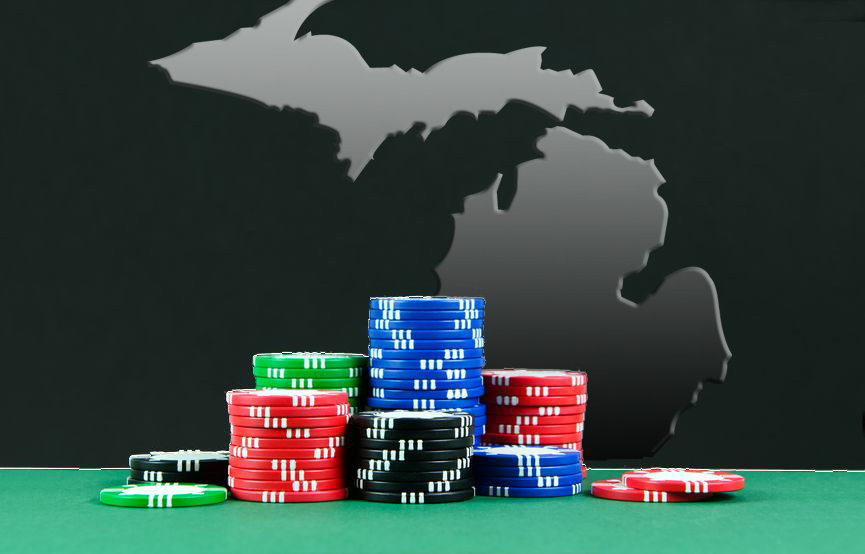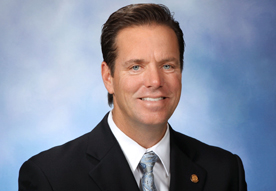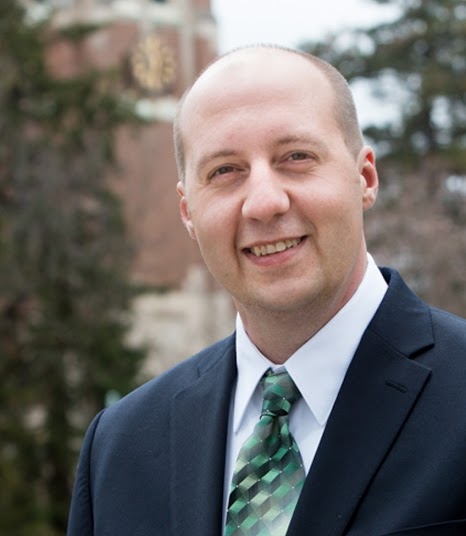State rolls dice on bills that would expand sports betting
LANSING — Will changes to Michigan sports betting rules be tied to a new round of proposed state laws, forthcoming court decisions or a federal overhaul of the industry?
So far, the answer to that question is a political roll of the dice.
Partly to keep up with changing technology, Michigan lawmakers are floating bills that would update gaming laws — some of which are decades old — and give casinos, horse tracks and millions of fantasy sports players in Michigan more control over sports gambling.
Yet some of the changes lawmakers and the gaming industry want to see — allowing Michigan casinos to operate sportsbooks and codifying legal status for fantasy sports players, among them — are either forbidden in Michigan under federal law or operating in a gray area without consistent state regulations.
That means, barring any court ruling or vote by Congress to update federal gaming laws, the bills pending in the Michigan Legislature could be invalid on the day they're adopted, provided they get that far.
Any efforts inevitably will encounter resistance to the notion of expanded gambling in Michigan. Governors from John Engler to Rick Snyder have been hesitant to allow horse racing tracks to install slot machines or video lottery terminals — something these bills don't attempt, though track owners continue to call for them as a way to raise revenue. And a 2004 amendment to the Michigan Constitution requires a statewide vote before any new form of gambling or state lottery game is approved, with the exception of tribal casinos and Detroit's commercial casinos.
Some industry insiders, though, say attitudes toward sports betting are changing nationally, as gambling in general becomes more widely accepted and bettors, with few legally sanctioned options, spend billions on the underground market.
Proponents of looser federal laws concerning sports gambling gained a high-profile ally in Adam Silver, commissioner of the National Basketball Association, who penned a November 2014 op-ed in The New York Times calling for "a comprehensive federal solution." That would include standard rules governing licensing, monitoring and minimum-age requirements while preserving the games' integrity.
The country's major sports leagues had all opposed any softer stance toward sports betting since at least the early 1990s.
"This industry has been moving so fast that the legislatures are really a little bit behind," said Michael Huff, an attorney with Grand Rapids-based Mika Meyers PLC and member of the Reston, Va.-based Sports Lawyers Association.
In Michigan, newly introduced gaming bills would allow casinos to operate sportsbooks and take bets on simulcast horse races, offer legal protections to fantasy sports betting, and update the state's horse racing statute.
MORE COVERAGE: “A bill aims to more fairly split purses at state’s last two racetracks”
Betting is big biz
A big reason for the recent legislative push is financial. State Rep. Robert Kosowski, D-Westland, whose casino bills earned a hearing last month in the House regulatory reform committee, proposed using some of the tax revenue from sportsbooks to fund road repairs.
Gaming is big business in Michigan. Detroit's three commercial casinos top $1 billion in annual receipts. They each pay a state wagering tax equal to 8.1 percent of their net win, which has generated $83.4 million in tax revenue through September, according to data from the Michigan Gaming Control Board, the casinos' regulating agency.
No one knows the size of the illegal market, but some estimates peg it at $400 billion annually flowing outside the watch of state and federal regulators, said Joseph Asher, CEO of British bookmaker William Hill PLC's U.S. division, who testified recently before the House committee. The House Fiscal Agency, in an analysis of Kosowski's bill, estimated Detroit's casinos could generate $25 million to $30 million in adjusted gross receipts annually on sports wagering, based on data from Nevada. That could drop up to $2.4 million per year in state casino taxes into Michigan's School Aid Fund and another $3.3 million annually into the city of Detroit's coffers from a local casino tax.
Yet sports betting totals just 2 percent of the statewide gaming pie in Nevada, the agency wrote, so it's not likely to be a major revenue factor.
It's not clear that all of Detroit's casinos could operate a sportsbook even if they wanted to.
Some professional sports league contracts prohibit casinos from offering sports betting if their owners also own teams. This could affect MotorCity Casino Hotel in particular, if it were to be decided that casino owner Marian Ilitch also shares ownership of the Detroit Tigers and Detroit Red Wings with husband Mike Ilitch.
Major League Baseball has more specific bans on this than the National Hockey League does, Huff said.
Detroit's casinos would not comment for this story. The American Gaming Association, a Washington, D.C.-based trade group representing the casino industry, said it has no position on the pending Michigan legislation.
The best solution would be for the state to manage all gaming, rather than leaving sports betting to black-market bookmakers, Kosowski said. Should Michigan casinos be allowed to operate sportsbooks, he added, it's not inconceivable that it could be a boon to state tourism.
"People go to Vegas just to sports-gamble," he said. "I think the market is there. I think we can capture it."
Federal law prevails
One problem with efforts to increase sports betting in Michigan: Federal law trumps states that want to set their own sports gambling rules.
The Professional and Amateur Sports Protection Act, passed in 1992, prohibits all state-sanctioned sports gambling. It exempted four states — Nevada, Delaware, Oregon and Montana — because they had previously operated some form of sports betting.
But that law, intended to prevent sports betting, led to a proliferation of under-the-table gambling, Asher said. His company, William Hill, operates sportsbooks in Las Vegas and is the manager of Delaware's sports lottery permitted under PASPA.
The issue is playing out in New Jersey, which passed a law in 2012 to legalize sports gambling. Major professional sports leagues and the National Collegiate Athletic Association sued, claiming New Jersey's statute violated federal law. The state lost.
New Jersey lawmakers partially repealed the state law in 2014, but the sports leagues sued again. A three-judge panel with the U.S. Third Circuit Court of Appeals again ruled against the state, but last month the court agreed to re-hear a challenge to the decision in front of the entire appellate bench. That decision vacated the earlier panel ruling (This can happen when questions of precedent arise or if judges are concerned the first decision was wrong).
Eileen DiRocco, publisher of Las Vegas-based trade journal Gaming Today, said regulating sports betting "is not something I believe the federal government should do. It should be up to the states.
"Individual states should be allowed to legalize and regulate sports betting, including fantasy, if they so choose," she said, adding that she expects significant progress to be made on the issue within five years.
In any case, a decision in New Jersey wouldn't be binding on Michigan because it's in a different federal judicial circuit, Huff said. He doesn't anticipate the U.S. Supreme Court would take up an appeal without split decisions from multiple appeals courts. Still, the ramifications not only could pave the way for sportsbooks at Michigan casinos, but also end the legal limbo about fantasy sites.
Chance vs. skill
Proponents of fantasy sports betting say Congress carved out an exception for them in the Unlawful Internet Gambling Enforcement Act, passed in 2006 to ban online wagering on games of chance.
But the issue remains open to interpretation about whether fantasy sports players are actually gambling when they pay to enter the game, create virtual teams and earn points — and potentially prizes — based on their virtual players' performance.
Sen. Curtis Hertel Jr., a Democrat from Ingham County's Meridian Township, sponsored the Michigan bill to decriminalize fantasy play. The chance-versus-skill question is clear, he said.
"When you're talking about Internet gambling, you're talking about a game of chance, where there's a house and the house takes the money. You're not playing individual people and you can't better your skills at a game like roulette or blackjack or slot machines," he said. "When it comes to fantasy sports, it's different.
"It's a knowledge-based game," where players with the most information have the advantage, he said.
See what new members are saying about why they donated to Bridge Michigan:
- “In order for this information to be accurate and unbiased it must be underwritten by its readers, not by special interests.” - Larry S.
- “Not many other media sources report on the topics Bridge does.” - Susan B.
- “Your journalism is outstanding and rare these days.” - Mark S.
If you want to ensure the future of nonpartisan, nonprofit Michigan journalism, please become a member today. You, too, will be asked why you donated and maybe we'll feature your quote next time!


 Congress and federal courts have not always been welcoming to states that try to expand their betting offerings
Congress and federal courts have not always been welcoming to states that try to expand their betting offerings State Rep. Robert Kosowski, D-Westland
State Rep. Robert Kosowski, D-Westland State Sen. Curtis Hertel Jr., D-Meridian Township
State Sen. Curtis Hertel Jr., D-Meridian Township